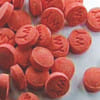HARDLY ANYTHING SAFE TO EAT
Gazi Shahab Uddin, a retired government employee, has lived his life. He now worries about his family, especially his six-year-old grandchild.
In his youth, food adulteration meant, at best, watering down milk or tampering with mustard oil. But now almost every food item, from rice to candies, is either adulterated or tainted with toxic chemicals.
The more the grandfather learns about food adulteration from media reports, the more helpless he feels. What will his grandchild eat? What is the future of the next generation?
"There is no food item that can be served without hesitation," said Shahab Uddin, a resident of Monipuripara in Dhaka and a regular shopper at the capital's kitchen markets.
Another regular shopper is Shahana, an NGO employee, whose concern surrounds her daughter as well as her elderly mother.
"My mother is scared of taking many foods as she has come to know about food adulteration from TV and newspapers. She doesn't want chicken, fish and fruit in her meals, though she needs a proper diet at this age," she said.
"Whenever my friends and I meet somewhere, the topic of food safety comes up. We share information about where to get formalin-free fish or fruit. We have almost stopped buying foods from regular shops or kitchen markets," added Shahana, a Lalmatia resident.
City dwellers have every reason to be alarmed.
Read all stories of our "Speak Out for Safe Food" series below-
- HARDLY ANYTHING SAFE TO EAT
- Profit, more profit
- PESTICIDES USEd 15 times the limit
- Old formalin in new bottle
- ILLEGAL, HARMFUL
- Confusing battle fought so far
- Too many cooks spoil the broth
- Evil rules as state sleeps
- Cold chain can save food supply chain
- Poisoning Poultry, Fish
- Green initiative left in the lurch
Over 10 thousand samples of more than 50 different food items were tested at the Institute of Public Health in 2012-13. About 60 percent of the samples were found adulterated or contaminated. Only the samples of sesame (til) oil, black pepper (gol morich) and fenugreek (methi) were reported safe.
Mixing of lower quality ingredients is adulteration and adding toxic chemicals is contamination. Both are widely practised in the country, said Dr Tahmeed Ahmed, director at the Centre for Nutrition & Food Security of ICDDR, B.
The chemicals used in food include formalin, calcium carbide, sodium cyclamate, colouring agents, dye, urea, DDT, aldrin, chlordane, heptachlor, melamine, burnt engine oil, hormone and sulphuric acid.

Studies have also detected the presence of heavy metals like chromium, arsenic, antibiotics and banned pesticides in food. Besides, there are major loopholes in hygiene practices that cause microbial growth in food.
Food adulteration and contamination pose a serious threat to public health, especially in a country like Bangladesh where the level of awareness among the masses is very low due to poor literacy.
The ensuing health hazards include diseases like cancer, kidney or liver failures, memory loss, respiratory problems, infertility, kidney stone and damage of the cardiac system.
There is no database in the country on such crucial factors, but the recent surge in the number of patients suffering from liver/kidney failure indicates a deteriorating situation.
Citing a recent study, Tahmeed warns that the number of cancer patients in Bangladesh could increase to nearly 5 lakh in 2035 from 2,32,868 in 2012.
At present, about 6,00,000 children suffer from acute malnutrition, 41 percent under-five children from stunted growth, while 70 percent of children are anaemic, and one in three is subclinical iodine deficient, he added.
Besides, according to the Centre for Nutrition & Food Security, a total of 16,57,381 cases of acute diarrhoea and resultant 2,064 deaths were reported in 1998 alone. Tahmeed believes impure food is one of the key factors behind all this.
So what should we eat? What should we avoid?
Raihana Ferdous, a mother of two, has stopped buying mangoes from city markets.
"Now it is hard to trust anybody," she said. "I wish I could test each and every food item before serving it to my children."
Raihana, who is a banker, lamented, "We are eating harmful food and living in a polluted environment in Dhaka."
When these concerns were conveyed to him, Dr Monirul Islam, director (nutrition) at Bangladesh Agricultural Research Council (BARC), said, "Fresh fruits and vegetables are safer than many other items in the market because people wash those before eating or cooking,"
The average residual life of modern pesticides is around three to five days, he said when reminded of reports on farmers using chemicals higher than usual and also too frequently.
Monirul, who has just completed a study titled "Contaminants and Adulterants in Food Chain and their Mitigation", noted that imported fruits like apples are also safe as growers use paraffin wax, classified as a preservative.

Non-commercial native fruits -- Amra (Hogplum), Kamranga (star fruit), Jolpai (olive), Dalim (Pomegranate), Amloki (Aonla), Lotkon (Burmese grape), Jamrul (Wax Jambu), Batabilebu (pummelo) and the likes -- are produced without using pesticides or hormones. So they are good enough, he said.
His study, yet to be published, notes that the quality of raw milk from state-run Milk Vita is good.
Even so, artificial liquid milk, made of low-quality powder milk, flour, arrowroot, sulphuric acid, mustard oil and lubricants, is flooding the market. Coliform and nitrate, formalin (four to five drops per litre) and heavy metals like chromium, lead and cadmium are also found in the milk.
To queries about other items of daily meals being safe or not, Monirul has no answers.
Sultana Kamal, chairperson of the trustee board of Transparency International Bangladesh, said the situation had turned worse because criminals had not been punished over the years.
Seeing that nothing happens even after a crime is committed, some people would do anything for profit.
"And exactly that's what is happening here."
Raihana Ferdous, the worried mother, has a question to ask: "Aren't our policymakers, especially politicians, including the president and prime minister, eating the same dangerous food bought from the markets in the capital?
"Unless they take imported food, they ought to worry as well," she said, "as the future of their children is as bleak as that of ours."

 For all latest news, follow The Daily Star's Google News channel.
For all latest news, follow The Daily Star's Google News channel. 






Comments